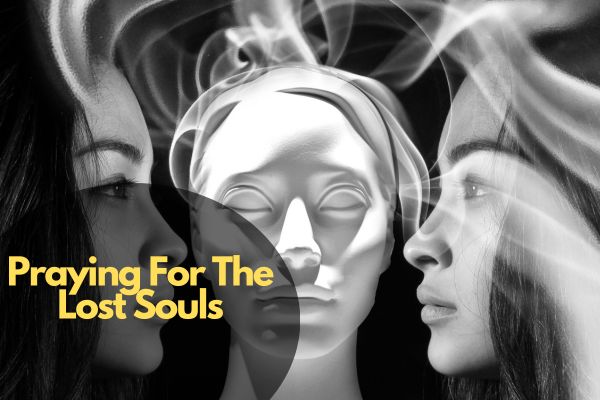Table of Contents Show
Praying for the lost souls, a practice deeply rooted in various religious and cultural traditions holds profound significance for believers worldwide. This age-old ritual transcends boundaries, offering solace to those grieving while fostering a connection between the living and the departed.
Praying For The Lost Souls
Praying for the lost souls, a timeless tradition rooted in compassion and spirituality, holds the key to connecting with the departed and finding solace in times of grief. In this enlightening guide, we will explore the depths of this practice, uncovering its significance, rituals, and the healing power it brings to those who embrace it.
Praying for lost souls is a heartfelt tradition encompassing diverse spiritual beliefs and customs. It refers to the act of offering prayers, blessings, or supplications for individuals who have passed away, with the hope of guiding their souls to a peaceful afterlife. This practice, rooted in compassion and empathy, has been an integral part of human existence, providing comfort to the bereaved and honoring the departed.
Historical and Cultural Significance
Across cultures and religions, prayers for lost souls have been woven into the fabric of societies. In Christianity, for instance, believers engage in prayers for the souls in purgatory, seeking their eventual salvation. Similarly, in Islam, the act of praying for the deceased is considered a sacred duty, demonstrating love and respect for the departed. Various Asian traditions, including Buddhism and Hinduism, also emphasize the importance of prayers for the departed, reflecting a universal human desire to ensure a peaceful transition for the souls of the deceased.
The Spiritual Aspect of Praying for Lost Souls
Beliefs about the afterlife vary widely, yet the common thread lies in the belief that prayers can influence the journey of departed souls. Many religions posit that sincere prayers can provide comfort to the departed, aiding their transition to the spiritual realm. The act of praying is seen as a bridge between the material and spiritual worlds, where the intentions of the living can positively impact the state of the departed souls.
Different Ways and Practices of Praying for Lost Souls
Prayer rituals associated with departed souls differ across religions. In Christianity, there are novenas and requiem masses, while Islam observes special funeral prayers called Janazah. Buddhists engage in merit-making ceremonies, and Hindus perform the Shraadh ritual. Additionally, individuals often undertake personal practices, such as lighting candles, reciting prayers, or offering charitable acts, to honor and pray for the souls of their loved ones.
Benefits of Praying for the Lost Souls
Beyond its spiritual significance, praying for lost souls offers immense benefits to those who engage in this practice. The act of compassionately remembering the departed can bring inner peace and emotional healing to the living. Moreover, believers often report a sense of connection with their loved ones, fostering a bond that transcends the boundaries of life and death.
Scientific and Psychological Perspectives
Recent studies have explored the psychological impact of prayer on individuals grieving the loss of a loved one. Engaging in prayer has been found to alleviate symptoms of depression, anxiety, and stress, providing a therapeutic outlet for those coping with grief. The power of collective prayer and communal support further enhances the emotional well-being of individuals navigating the challenges of bereavement.
Coping with Grief Through Prayer
Grief is a complex and individual experience, and praying for lost souls can serve as a coping mechanism for many. Through the act of prayer, individuals find solace in the belief that their loved ones are at peace, transcending the physical realm. Testimonials abound, recounting how the practice of praying has provided comfort and strength, enabling individuals to navigate the tumultuous waters of grief with grace and resilience.
Praying for Lost Souls in Contemporary Society
In today’s digital age, the practice of praying for lost souls has found new avenues of expression. Online communities and platforms dedicated to collective prayer have emerged, allowing individuals from diverse backgrounds to come together and offer prayers for the departed. These virtual spaces provide a sense of belonging and solidarity, fostering a global community bonded by compassion and shared grief.
Debunking Myths and Misconceptions
Despite the widespread acceptance of praying for lost souls, myths and misconceptions persist. Some question the efficacy of prayers, while others raise ethical concerns about the practice. Addressing these doubts is essential, as understanding the significance and intention behind prayers can dispel misconceptions, allowing individuals to engage in this tradition with a genuine heart and a clear mind.
Cultural Variations in Praying for the Lost Souls
Cultural diversity enriches the practice of praying for lost souls, leading to a myriad of customs and rituals. While some cultures observe solemn ceremonies, others celebrate the departed with vibrant festivities. These cultural variations highlight the beauty of human expression, emphasizing the universal desire to honor and remember those who have passed away.
Praying for Lost Souls in Art and Literature
The theme of praying for lost souls has inspired artists, writers, and filmmakers for centuries. Paintings depict poignant moments of prayer, capturing the raw emotions of grief and hope. Literature weaves intricate narratives around the power of prayers, exploring the depths of human spirituality and the interconnectedness of life and death. Through these artistic expressions, the essence of praying for lost souls is immortalized, resonating with audiences across time and cultures.
Critiques and Controversies
While the practice of praying for lost souls is deeply meaningful for many, it is not without its critiques and controversies. Some argue that the focus on the afterlife detracts from addressing present issues, while others raise ethical concerns about the commodification of prayers. Engaging in meaningful dialogue about these concerns is crucial, fostering a nuanced understanding of the practice and encouraging individuals to approach it with sincerity and authenticity.
Global Perspectives and Unity in Diversity
Despite the differences in customs and beliefs, the act of praying for lost souls unites humanity in a shared experience of loss and remembrance. Across the globe, people from diverse backgrounds come together to honor the departed, emphasizing the common thread that binds us all. In this unity of purpose, there is a profound recognition of our shared humanity, transcending borders and fostering a sense of empathy and compassion.
Conclusion
In the tapestry of human existence, praying for the lost souls stands as a testament to our collective yearning for connection, compassion, and continuity. This ancient practice, steeped in tradition and spirituality, provides solace to the grieving and offers a glimpse into the enduring bonds that transcend the boundaries of life and death. As we navigate the complexities of existence, the act of praying for lost souls serves as a reminder of our shared humanity, weaving a thread of love and remembrance that spans generations.
FAQs:
- Is praying for the lost souls specific to certain religions?
- Praying for lost souls is a practice found in various religions and cultures worldwide. While specific rituals may vary, the underlying intention of honoring the departed is universal.
- Can prayers really influence the afterlife?
- Different belief systems posit varying perspectives on the efficacy of prayers for the departed. While spiritual traditions emphasize the impact of prayers, interpretations vary widely.
- Are there any scientific studies supporting the benefits of praying for the deceased?
- Yes, several studies have explored the psychological and emotional benefits of engaging in prayer for the departed. These studies highlight the therapeutic effects of prayer on individuals coping with grief.
- How can one find solace through praying for lost souls?
- Finding solace through prayer often involves a deep sense of connection with the departed, fostering a belief in their peaceful journey. Engaging in meaningful rituals and practices can provide comfort and emotional healing.








